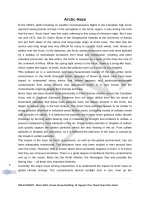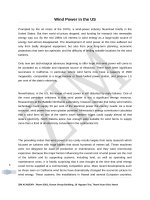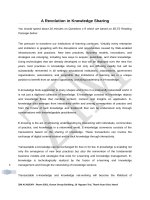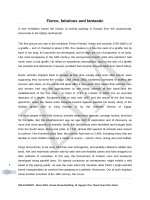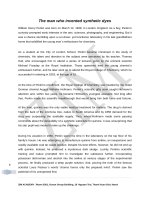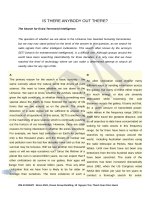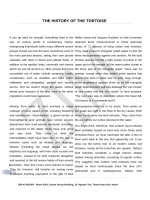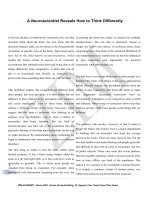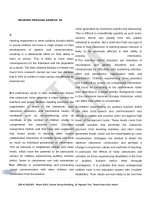IELTS academic reading sample 46 a revolution in knowledge sharing
Bạn đang xem bản rút gọn của tài liệu. Xem và tải ngay bản đầy đủ của tài liệu tại đây (62.59 KB, 4 trang )
A Revolution in Knowledge Sharing
You should spend about 20 minutes on Questions 1-9 which are based on IELTS Reading
Passage below:
The pressure to transform our institutions of learning continues. Virtually every enterprise
and institution is grappling with the disruptions and opportunities caused by Web-enabled
infrastructures and practices. New best practices, business models, innovations, and
strategies are emerging, including new ways to acquire, assimilate, and share knowledge.
Using technologies that are already developed or that will be deployed over the next five
years, best practices in knowledge sharing not only are diffusing rapidly but will be
substantially reinvented in all settings: educational institutions, corporations, government
organizations, associations, and nonprofits. But institutions of learning are in a unique
position to benefit from an added opportunity: providing leadership in e-knowledge.
E-knowledge finds expression in many shapes and forms in a profoundly networked world. It
is not just a digitised collection of knowledge. E-knowledge consists of knowledge objects
and knowledge flows that combine content, context, and insights on application. Eknowledge also emerges from interactivity within and among communities of practice and
from the troves of tacit knowledge and tradecraft that can be understood only through
conversations with knowledgeable practitioners.
E-knowing is the act of achieving understanding by interacting with individuals, communities
of practice, and knowledge in a networked world. E-knowledge commerce consists of the
transactions based on the sharing of knowledge. These transactions can involve the
exchange of digital content/context and/or tacit knowledge through interactivity.
Transactable e-knowledge can be exchanged for free or for fee. E-knowledge is enabling not
only the emergence of new best practices but also the reinvention of the fundamental
business models and strategies that exist for e-learning and knowledge management. Eknowledge is technologically realized by the fusion of e-learning and knowledge
4
management and through the networking of knowledge workers.
Transactable e-knowledge and knowledge net-working will become the lifeblood of
ZIM ACADEMY | Room 2501, Ocean Group Building, 19 Nguyen Trai, Thanh Xuan Dist, Hanoi
knowledge sharing. They will create a vibrant market for e-knowledge commerce and will
stimulate dramatic changes in the knowledge ecologies of enterprises of all kinds. They will
support a “Knowledge Economy” based on creating, distributing, and adding value to
knowledge, the very activities in which colleges and universities are engaged. Yet few
colleges and universities have taken sufficient account of the need to use their knowledge
assets to achieve strategic differentiation.
In “It Doesn’t Matter,” a recent article in Harvard Business Review, Nicholas G. Carr
endorsed corporate leaders’ growing view that information technology offers only limited
potential for strategic differentiation. Similar points are starting to be made about e-learning,
and knowledge management has been under fire as ineffectual for some time.
The truth is that e-learning and knowledge management can provide strategic differentiation
only if they drive genuine innovation and business practice changes that yield greater value
for learners. Carr’s article provoked a host of contrary responses, including a letter from
John Seely Brown and John Hagel III. Brown is well-known for his insights into the ways in
which knowledge sharing can provide organizations with a solid basis for strategic
differentiation.
Reprinted with permission. © 2003 Donald M. Norris, Jon Mason, Robby Robson, Paul
Lefrere, and Geoff Collier. “A Revolution in Knowledge Sharing,” EDUCAUSE Review, vol.
38, no. 5 (September/October 2003): 14-26.
For questions 1-4, choose NO MORE than TWO WORDS for each answer.
Thanks to the advent of the computer, learning institutions today are providing new ways of
acquiring knowledge, through tools that are 1.................... fast and which are being
already 2...................... in all fields and settings, despite the3................... the process may
entail, which all institutions are now 4...............................
For Question 5-9 are based on the paragraph 46.
In boxes 5 - 9 on your answer sheet, write
YES
4
NO
if the statement agrees with the views of the writer
if the statement contradicts the views of the writer
NOT GIVEN
if it is impossible to say what the writer thinks about this
ZIM ACADEMY | Room 2501, Ocean Group Building, 19 Nguyen Trai, Thanh Xuan Dist, Hanoi
5. E-knowledge is primarily based on practices used in business.
6. Educational institutions can be leaders in knowledge net-working.
7. E-knowledge has several benefits to it.
8. Communities of practice are one source of E-knowledge.
9. The key to the success of knowledge management and e-learning is offering strategic
differentiation.
4
ZIM ACADEMY | Room 2501, Ocean Group Building, 19 Nguyen Trai, Thanh Xuan Dist, Hanoi
Answer:
1. Diffusing
2. deployed
3. disruptions
4. grappling with
5. NO
6. YES
7. YES
8. YES
9. YES
4
ZIM ACADEMY | Room 2501, Ocean Group Building, 19 Nguyen Trai, Thanh Xuan Dist, Hanoi
